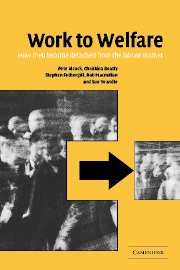Book contents
- Frontmatter
- Contents
- List of figures
- List of tables
- Notes on the authors
- Preface
- List of abbreviations
- Part I The context for labour market detachment
- Part II New evidence from the UK
- 4 The detached male workforce
- 5 Incapacity Benefit and unemployment
- 6 The over 50s
- 7 Family, life course and labour market detachment
- 8 The role of health in labour market detachment
- 9 Getting by
- 10 Back to work?
- Part III The policy implications
- Appendix: Research methodology
- References
- Index
7 - Family, life course and labour market detachment
Published online by Cambridge University Press: 22 September 2009
- Frontmatter
- Contents
- List of figures
- List of tables
- Notes on the authors
- Preface
- List of abbreviations
- Part I The context for labour market detachment
- Part II New evidence from the UK
- 4 The detached male workforce
- 5 Incapacity Benefit and unemployment
- 6 The over 50s
- 7 Family, life course and labour market detachment
- 8 The role of health in labour market detachment
- 9 Getting by
- 10 Back to work?
- Part III The policy implications
- Appendix: Research methodology
- References
- Index
Summary
For much of the twentieth century, all men were expected to work full time, to marry, to provide lifelong financial support for a wife and to maintain their dependent children. Indeed, the British welfare state was built on these expectations about men's lives, widely referred to as the ‘male breadwinner model’ (Land 1980, Millar 1999). When the present study began in 1997, it was already evident that these assumptions did not reflect reality for a growing segment of the male population (Haskey 1984, Cohen 1987). So far as work was concerned, lifelong full-time employment was no longer possible for many men and, in private life, there was more frequent divorce and repartnering, an increase in living alone and more widespread cohabitation outside marriage.
This chapter explores how men's family circumstances and their stage in the life course interact with their labour market experiences. From our survey data, we can sketch the parameters of how men's family and household circumstances relate to their detachment from the labour market. The follow-up interviews provide fuller information on the personal and household circumstances of a sub-sample of the men, and probe more deeply into the complexities of their situation.
The family and household circumstances of men who are detached from the labour market: evidence from the survey
Two-thirds of our sample of ‘detached’ men were married, almost a fifth were single and a tenth were divorced or separated.
- Type
- Chapter
- Information
- Work to WelfareHow Men Become Detached from the Labour Market, pp. 162 - 186Publisher: Cambridge University PressPrint publication year: 2003

